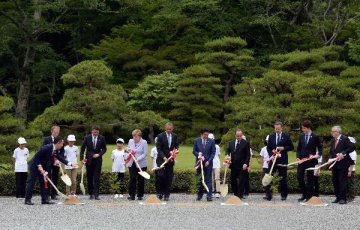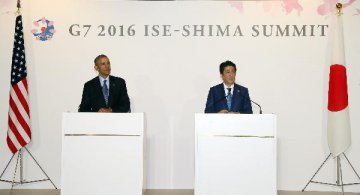
While leaders of the Group of Seven (G7) industrialized countries are gathering here for a summit meeting to tackle global economic uncertainties, there seems to be no much optimism for reaching practical solutions at the discussion table.
Despite a heavy agenda, the G7 leaders' summit, kicking off here Thursday, might yield little due to unsolved disparities and, very likely, only serve for the host country's self-interests, said observers.
DIVERGENCE AMID WANING INFLUENCE
Japan, presiding over the two-day summit in Mie Prefecture, has aimed to lead the group to "deliver a positive message to address challenges to global economic growth and other risks," among other tasks to be discussed at the meeting.
However, while there is a high level of concern about the weakness of the global economy, options for stimulus on the monetary front are extremely limited, and there are deep divisions over any expansion of fiscal deficits, said Barry Bosworth, a Brookings Institution economist and former U.S. presidential adviser.
"While the group may voice common concerns about the state of the global economy, there is no consensus about how those concerns should be addressed, and each member will be left to tailor their actions to their own individual needs," he wrote in an article ahead of the summit.
At the G7 financial ministers' gathering in northeastern Japan that concluded last Saturday, attempts to narrow gap on the foreign exchange rate and coordinate steps to boost public spending so as to improve world economy growth both failed.
Kamakura Takao, professor emeritus of Saitama University, said that concerning the economic topics, he expects the G7 summit to repeat the situation at the finance ministers' meeting, yielding no practical results that would improve the world economy.
Also, even if there would be certain concrete progress on coordinating action on economic stimulus, as the group of wealthy countries is losing its share in the global economy in face of stronger emerging economies, its influence on the governance of the global economy might not be so strong as before.
In 2000, the group used to account for 66 percent of the global GDP, but the share significantly shrank to 47 percent in 2013. With the rise of emerging economies, other cooperation mechanisms like the Group of 20 are becoming more relevant to addressing the global economic issues.
A HOST WITH HIDDEN AGENDA
Apart from policy divergence, Japan, as the host country, is apparently putting its own intentions above seeking the common interests of the group or the world.
While ambitiously vowing to "take leadership in guiding the world by showing the best path from a global perspective for peace and prosperity at the regional and global level," Japan has laid much emphasis on self-promotion and hyping up regional disputes like the South China Sea issue.
In a clear gesture to present its Shinto culture, the host country chose to kick-start the summit with Prime Minister Shinzo Abe touring leaders of other six countries to the Ise Jingu, one of Japan's most revered Shinto shrines, here Thursday morning.
Meanwhile, some 2.8 billion yen (about 25.5 million U.S. dollars) has been spent solely on the summit's international media center, most of which was put into tourism promotions, according to Japanese officials.
Promoting global economic recovery is not the target of Japan's massive spending on the summit, said Professor Kamakura. This might be desirable for Abe, but would do no good to Japan itself, Kamakura said, adding that the enormous spending would further burden the country's bleak fiscal condition.
His view was echoed by Zhu Jianrong, a professor with Toyo Gakuen University, who told Xinhua that the Abe administration is taking the summit as an opportunity to demonstrate its influence in the developed world to the Japanese public so as to win more votes in the upcoming election.
On the other hand, by eagerly foisting the South China Sea issue into the summit's agenda, Japan is working to win support from the six other counterparts for its own purpose like containing China, said Zhu.




















Latest comments